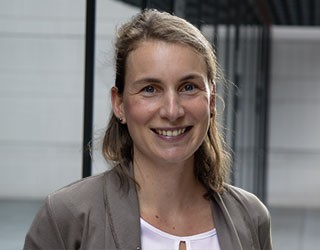Areas of expertise
- Human migration and local livelihoods
- Social-ecological systems
- Quantitative, qualitative and participatory approaches (QCA, Bayesian networks, regression analysis, GIS)
- Structural change and regional transformation
Experience
Dr. Juliane Groth has been working as a research fellow in the Innovative Regions unit at Fraunhofer IMW since July 2023. Previously, she worked as a research fellow and PhD student at the Helmholtz Centre for Environmental Research (UFZ) in Leipzig.
In her doctoral thesis entitled “The linkages between migration and environmental change in Ethiopia – Empirical evidence from rural sending and receiving areas“, she used qualitative and participatory methods to explore the interplay of various ecological, social, economic, institutional and political factors influencing migration decisions. Using an analytical-statistical approach, she showed the migration consequences related to the environmental and living situation of migrants and the receiving society.
From 2015 to 2017, Juliane Groth worked as a researcher at the United Nations University - Institute for Environmental and Human Secuirty (UNU-EHS) in Bonn on a project creating a risk and vulnerability index for Northern Kyrgyzstan. Before that, she studied Geography at the University of Innsbruck (M. Sc.) and Technical University of Dresden (B. Sc.).
Juliane Groth holds extensive experience in location-based socio-ecological research, the implementation of international field campaigns for data collection and qualitative-participative and statistical-analytical analysis approaches. She applies her diverse knowledge and skills in various projects at Fraunhofer IMW on the topics of structural change, sustainable regional transformation and innovation dynamics and on the evaluation of funding programs.
Current projects
- Genesis - Shaping new development paths in structural change in Saxony
- Q.E.D. - Quantum Ecosystem Germany
- Focus study "Quantum technologies and quantum ecosystems"
